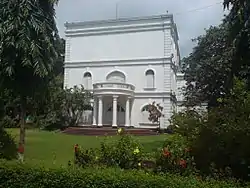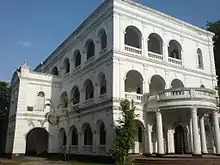Bangla Academy
Bangla Academy (Bengali: বাংলা একাডেমি, pronounced [baŋla ækaɖemi]) is an autonomous institution funded by Bangladesh government to promote and foster the Bengali language, literature and culture, to develop and implement national language policy and to do original research in the Bengali language. Established in 1955, it is located in Burdwan House in Ramna, Dhaka, within the grounds of the University of Dhaka and Suhrawardy Udyan. Bangla Academy hosts the annual Ekushey Book Fair.
বাংলা একাডেমি | |
 | |
 Burdwan House, Bangla Academy main building | |
| Formation | 3 December 1955 |
|---|---|
| Type | Autonomous institution funded by Government of Bangladesh |
| Headquarters | Burdwan House |
| Location |
|
Official language | Bengali |
Director General | Habibullah Siraji |
| Website | banglaacademy |
History
.JPG.webp)
The importance of establishing an organisation for Bengali language was first emphasised by the linguist Muhammad Shahidullah.[1][2] Later, following the Language movement, on 27 April 1952, the All Party National Language Committee decided to demand establishment of an organisation for the promotion of Bengali language. During the 1954 parliamentary elections, the United Front's 21-point manifesto stated that, "The prime minister from the United Front will dedicate the Bardhaman House for establishing a research center for the Bengali language".[2] Following the election success of the Front, the education minister Syed Azizul Haque placed the order to fulfill this promise.
In 1955, the government formed a committee to expedite the process. The committee was composed of leading intellectuals like Muhammad Shahidullah, Qazi Motahar Hossain, S.M. Bhattacharya, W. H. Shadani, and Muhammad Barkatullah. On 3 December 1955, the Chief Minister of East Bengal, Abu Hussain Sarkar, inaugurated the institute.[2] Barkatullah acted as the Special Officer in charge. Later, in 1956, Muhammad Enamul Haque took over as the first director.[3]
In 1957, an act of the parliament formally established the funding source and the Government support for the institute.[2] The first book published by the academy was Laili Maznu, an epic by the medieval poet Dawlat Ujir Bahram Khan, and edited by Ahmed Sharif. The first fellow of the academy was the poet Farrukh Ahmed.[2]
The publication division was established in early 1957; the research, culture and library divisions and translation division were set in 1958 and 1961 respectively.[4]
After the independence of Bangladesh, the director's position was renamed Director General.[3] Mazharul Islam, head of Bangla Department of Rajshahi University, was the first Director General of the institute.[5] On 19 September 2008, a new 8-storied building, containing a 500-capacity auditorium and a 100-capacity seminar room, opened next to the main building.

Structure
The functions and structure of the institute was devised on the model of the French Academy.[3]
Divisions
- Research, compilation and folklore
- Language, literature, culture and publication
- Textbook
- Planning and training
Activities
The main task of the Academy is to conduct research on Bengali language, culture, and history, and to publish Bengali literary and research work.
To commemorate the Language movement and the Language martyr's day, the Academy organizes the month-long Ekushey Book Fair, the largest book fair in the country. It was introduced by former director general Monzur-I-Mowla.
Criticism
In recent years, Bangla Academy has been widely criticized for allowing different organizations to arrange events in English and denigrating Bengali in the premise of Bangla Academy, which is a violation of visions of the institution.[6] "The Academy has misused a lot of funds in producing useless books, books that are unoriginal," opines Salimullah Khan.[7] Khan is of the opinion that the Academy is short on original publications long on dross.[7] He believes that both in research and in the field of creative writing, originality must be given priority. He also adds that most of the problems lie in the process of selection. The selection process the crucial decision to ditch one manuscript to pick another that will be added to the long list of academy publications, is faulty and in dire need of revision.[7]
Awards given by Bangla Academy
Bangla Academy Literary Award
Rabindra Award
This award is conferred for significant contributions to Rabindranath Tagore works.[8]
- 2010 – Kalim Sharafi and Sanjida Khatun
- 2011 – Ahmed Rafiq and Ajit Roy
- 2012 – Anisur Rahman, Fahmida Khatun and Iffat Ara Dewan
- 2013 – Karunamaya Goswami and Papia Sarwar
- 2014 – Manzoore Mawla and Rezwana Chowdhury Bannya
- 2015 – Sanat Kumar Saha and Sadi Mohammad
- 2016 – Syed Akram Hossain and Tapan Mahmud
- 2017 – Hayat Mahmud and Mita Haque
Presidents
| Years | President | Profession |
|---|---|---|
| 1961–1961 | Mohammad Akram Khan | Journalist and politician |
| 1962–1963 | Mohammad Barkatullah | Writer |
| 1964–1965 | Muhammad Qudrat-i-Khuda | Educationist |
| 1969–1971 | Syed Murtaza Ali | Writer and historian |
| 1972–1974 | Zainul Abedin | Painter |
| 1975–1977 | Syed Murtaza Ali | |
| 1977–1979 | Syed Ali Ahsan | Poet and educator |
| 1980–1982 | AFM Abdul Huq Faridi | |
| 1982–1983 | Abu Mohammed Habibullah | |
| 1986–1990 | Abdullah-Al-Muti | Educationist |
| 1990–1992 | Gazi Shamsur Rahman | Lawyer |
| 1993–1994 | Abdur Rahman Chowdhury | Justice |
| 1994–1996 | Gazi Shamsur Rahman | |
| 1996–1999 | Shamsur Rahman | Poet |
| 1999–2002 | Anisuzzaman | |
| 2002–2006 | Wakil Ahmed | |
| 2007–2009 | M Harunur Rashid | |
| 2009–2011 | Kabir Chowdhury | |
| 2011–2020 | Anisuzzaman[10] | |
| 2020–present | Shamsuzzaman Khan[11] | Folklorist |
List of Honorary Fellows
As of 2018, there are 173 persons made Honorary Fellows by the academy.[8]
- Mohammad Akram Khan
- Muhammad Shahidullah
- Golam Mustafa
- Jasimuddin
- Shamsunnahar Mahmud
- Zainul Abedin
- Khan Bahadur Ahsanullah
- Sheikh Reazudin Ahmed
- Sheikh Habibor Rahman
- Nurunnesa Khatun
- Mozammel Huq
- Khoda Box
- Aroj Ali Matubbar
- Mozibor Rahman Biswas
- Mahbubul Alam Chowdhury
- Monindro Nath
- Sheikh Lutfor Rahman
- Kamaluddin Ahmed
- Shafiuddin Ahmed
- Quamrul Hassan
- Abu Sayeed Chowdhury
- Abdul Ahad
- A R Mallick
- Shah Fazlur Rahman
- Abdur Razzaq
- Muhammad Ibrahim
- Muhammad Shamsul Huq
- Mohammad Nurul Huq
- Dewan Mohammad Azraf
- A U M Abdul Huq Faridi
- Firoza Begum
- Kalim Sharafi
- Khan Sarwar Murshid
- A N M Gaziul Haque
- A.F. Salahuddin Ahmed
- Barin Mazumder
- Lutfar Rahman Sarkar
- Abdul Latif
- Nurjahan Begum
- Sudhin Das
- Ajoy Roy
- Sirajul Islam
- Sohrabuddin Ahmed
- Nazrul Islam
- Rafiqun Nabi
- Amolesh Chandra Mandal
- 1975
- 2001
- Qayyum Chowdhury
- Mohammad Saidur
- Abdul Halim Boyati
- Abdul Matin
- Tofail Ahmed
- 2002
- 2003
- Mohammad Ferdous Khan
- Emazuddin Ahmed
- Ferdousi Rahman
- 2004
- 2005
- M. Shamsher Ali
- M H Khan
- M Q K Talukdar
- Sudhananda Mohather
- William Radice
- 2006
- Kazi Azhar Ali
- Kazi Abdul Fattah
- T A Chowdhury
- Jamilur Reza Choudhury
- 2007
- M Innas Ali
- A M Harun Ar Rashid
- Mozaffar Ahmed
- M Abul Hashem Khan
- Sohrab Hossain
- Nuruddin Ahmed
- M Kamrul Islam
- 2008
- Musharraf Hossain
- Khondoker Ibrahim Khaled
- Mizanur Rahman Shelley
- Sultana Kamal
- Mahbub Alam
- Sonia Nishat Amin
- Saidur Rahman Boyati
- Nurul Islam
- 2009
- Nurul Islam
- Amanul Huq
- Imdad Hossain
- Rowsan Ara Bachchu
- A B M Musa
- Ataus Samad
- Abul Maal Abdul Muhith
- M. Amir-ul Islam
- M Mahbubur Rahman
- A B M Abdul Latif Miah
- Akbar Ali Khan
- Ferdousi Mazumder
- Bibi Russell
- Muhammad Habibullah Pathan
- M Abdus Samad Mandal
- Kazuo Azuma
- Clinton B. Seely
- 2010
- Atiqul Huq Chowdhury
- A B M Hossain
- Kamal Lohani
- Jamil Chowdhury
- Enamul Huq
- Sahanara Hossen
- Mustafa Zaman Abbasi
- Rashid Talukdar
- Ramendu Majumdar
- Laila Hasan
- Farida Parveen
- 2011
- Amartya Sen
- Sheikh Hasina
- Abdur Rouf
- Sheikh Hafizur Rahman
- Md. Tafazzul Islam
- Mustafa Monwar
- Rehman Sobhan
- 2012
- Md. Tafazzul Islam
- Muhiuddin Khan Alamgir
- Mohiuddin Ahmed
- Runa Laila
- M Saiduzzaman
- Murtoza Bashir
- Ramkanai Das
- Pran Gopla Datta
- Atiur Rahman
- Sabina Yasmin
- 2013
- Syed Hasan Imam
- Monaem Sarker
- Fakir Alamgir
- A. T. M. Shamsul Huda
- Ferdousi Priyabhashini
- Shahadat Hossain Khan
- Nasiruddin Yousuff
- Abul Hasnat
- 2014
- Partha Pratim Majumder
- Ataur Rahman
- Mohammad Zamir
- A. B. M. Khairul Haque
- Abdul Mannan Choudhury
- Shimul Yousuf
- Fatema Tuz Zohra
- 2015
- Fazle Hasan Abed
- Mohammed Farashuddin
- Anupam Sen
- Abed Khan
- Abu Mohammad Shapan Adnan
- Mahfuz Anam
- Papia Sarwar
- 2016
- Toyab Khan
- Alamgir Muhammad Serajuddin
- Abul Kalam Azad Chowdhury
- Rafique Ul Huq
- Rathindranath Roy
- Shaikh Siraj
- Mushtari Shafi
- 2017
- Iqbal Bahar Chowdhury
- Pratibha Matsudi
- ABM Abdullah
- Ainun Nishat
- Nurun Nabi
- Hassan Shahriar
- Dulal Talukder[13]
- 2018
- Monirul Islam
- Aminul Islam
- Monjulika Chakma
- SM Mohsin
- Samanta Lal Sen
- Rawshan Ara Mustafiz
- Polan Sarkar[14]
- 2019
- Syed Anwar Hossain
- Sheikh Mohammed Shahidullah
- Abdul Malik
- Kumudini Hajong
- Kangalini Sufiya
- Ali Zakar
- Asaduzzaman Noor
References
- Al-Helal, Bashir (1986). Bangla Academy'r Itihaas (History of Bangla Academy) (in Bengali). Dhaka, Bangladesh: Bangla Academy.
- Mamun, Muntasir (January 2004) [1993]. Dhaka: Smriti Bismritir Nogori (in Bengali) (3rd edition, 4th printing ed.). Dhaka, Bangladesh: Ananya Publishers. pp. 178–180. ISBN 984-412-104-3.
- Islam, Sirajul (2012). "Bangla Academy". In Islam, Sirajul; Helal, Bashir Al (eds.). Banglapedia: National Encyclopedia of Bangladesh (Second ed.). Asiatic Society of Bangladesh.
- বাংলা একাডেমির সংক্ষিপ্ত ইতিহাস. Bangla Academy (in Bengali). Retrieved 11 August 2016.
- "Bangla Academy marks 54th founding anniv today". Dhaka Mirror. New Age BD. Retrieved 31 May 2015.
- 'ঢাকা লিট ফেস্ট'-এর পৃষ্ঠপোষকতা ও ইংরেজিকে 'লিডিং' অবস্থানে নিয়ে যাওয়ার ব্যবস্থা!. bdnews24.com (Opinion) (in Bengali). 12 November 2018. Retrieved 20 December 2018.
- "Losing Sight of Priorities". Star Magazine. The Daily Star. Retrieved 4 February 2019.
- পুরস্কারপ্রাপ্তদের তালিকা [Winners list] (in Bengali). Bangla Academy. Retrieved 31 July 2017.
- "Mazharul Islam Award introduced". The Daily Star. 10 September 2009. Retrieved 17 December 2017.
- বাংলা একাডেমির প্রাক্তন সভাপতিগণ [Former Presidents of Bangla Academy] (in Bengali). Bangla Academy. Retrieved 27 March 2017.
- "Shamsuzzaman Khan becomes Bangla Academy president". New Age. Retrieved 9 November 2020.
- Islam, Sirajul (2012). "Nasiruddin, Mohammad". In Islam, Sirajul; Quiyum, Nurul (eds.). Banglapedia: National Encyclopedia of Bangladesh (Second ed.). Asiatic Society of Bangladesh.
- "40th ABM of Bangla Academy held". United News. 30 December 2017. Retrieved 28 January 2019.
- "Artist Monirul Islam gets Bangla Academy Honouary Fellowship". Retrieved 28 January 2019.